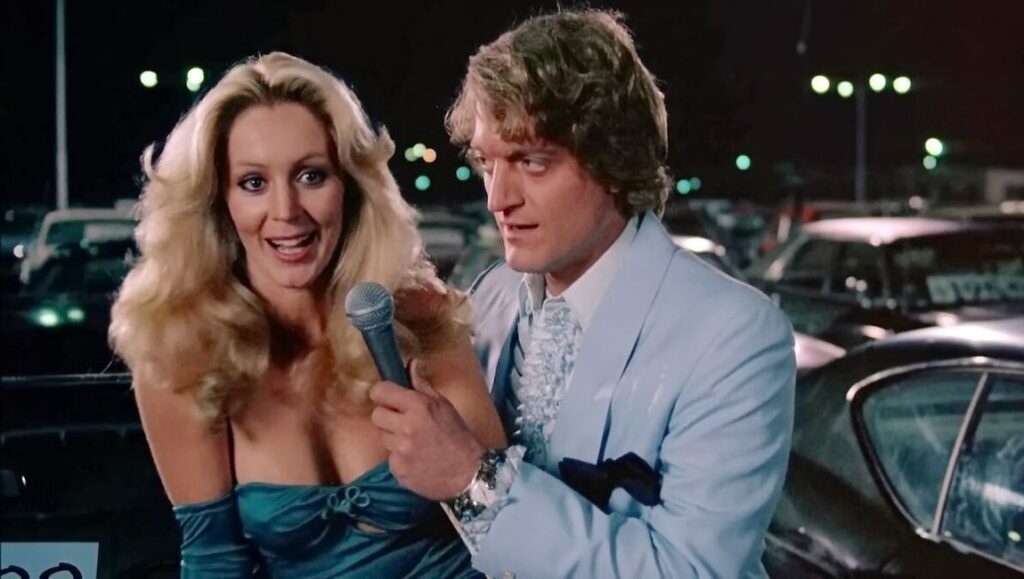Though the vast majority of Robert Zemeckis’ films are family-friendly, it’s also easy to find cruelty and blatant sexuality in nearly all of them, the two often intermingled. It might be easy to identify the incestual overtones of Lorraine Baines-McFly’s advances on her future son as a cringeworthy element of Back to the Future, but that’s tame compared to the plot hinging on Marty’s plan to stage the sexual assault of his own mother, whose alternate future subjugation is the horrific jumping off point in the sequel. But in those films, like in Forrest Gump, Roger Rabbit and even The Witches, Zemeckis’ rough edges and tendency to punch down — not to mention his obvious obsession with massive breasts — are dressed in the language of carefree fun and sentimentality, normalized to the point of barely registering.
This is not the case with his second feature, Used Cars, a film that, on its surface, has more in common with other bawdy comedies of the 1980s than the future films of Zemeckis and Bob Gale. Filled with loathsome characters on both sides of its conflict, Used Cars — Zemeckis’ only R-rated film until Flight — has little room for the mask of romantic nostalgia that characterizes the director’s other films. It’s a comedy of scumbags and con-men, a battle between lowlife hucksters presented with a political edge, as if the economic and political future of the country was in the hands of used car salesmen. Obviously, it’s the funniest thing Zemeckis has ever made.
The film captures Kurt Russell coming off a decade’s worth of family-oriented Disney fare and right before he became a tough guy icon with John Carpenter. Russell’s Rudy Russo is the typical image of a used car salesman: brash, deceitful, and out for a fast buck. He tells people what they want to hear about vehicles they should not buy at any price, let alone what he’s marking them up for. In the film’s opening, Rudy resets a car’s odometer by several hundred thousand miles, inflates the tire of another, and uses a sale sign to cover up a broken windshield. This man, our hero, works on a beaten down lot owned by Luke Fuchs (Jack Warden), a kind old man with a heart condition who seems much too honest for this line of work. Luke even fronts Rudy $10,000 for his senate campaign, which is his main motivation throughout.
But Luke’s lot is failing while his evil twin brother Roy (again, Warden) maintains a much nicer, more successful lot directly across the street. Luke does not play dirty the way his brother and Rudy will and is instead trying to run an honest business. Roy, wanting to control Luke’s lot so that he can benefit from the encroaching construction of a freeway exit, plots his brother’s death.
Once Luke is out of the picture and the plot is in motion, Rudy and Roy engage in a game of crude one-upmanship, sinking lower and lower to try and attract customers. Roy draws them in with circus animals and other gimmicks while Rudy broadcasts commercials on hijacked signals, one of which leads one young viewer to stand up at the TV and announce “Hey look, bare tits!” Meanwhile, the reappearance of Luke’s estranged daughter sparks a romantic subplot between her and Rudy that creates the circumstances for the film’s big finale while presenting Rudy with what seems like the first moral dilemma of his life.
Though Used Cars is certainly an outlier among Zemeckis films, it can still seem like a Rosetta stone to his later work in retrospect. While his debut, I Wanna Hold Your Hand, and Forrest Gump chart moments of America’s past the same way that the Back to the Future films do, Used Cars’ interest in the present and future is concerned with the cost of economic progress and the cult of celebrity in similar ways. That the plot hinges on the destructive construction of a new freeway exit even directly foreshadows those same concerns being crucial to Who Framed Roger Rabbit. The grand finale, Zemeckis’ first real action scene, finds hundreds of cars driven by less than capable drivers in a massive chase sequence. It points to the more formally accomplished action set pieces that he would achieve later, but is still among the biggest, funniest ,and flat-out most exciting sequences he’s crafted. Even if Used Cars seems at first glance like a left turn, a brief excursion into something different before massive success, it is a vital piece in charting Zemeckis’ arc as a filmmaker. His more sentimental inclinations hadn’t yet taken root, but nearly everything else was there already.
Part of Robert Zemeckis: Movie Magician


Comments are closed.